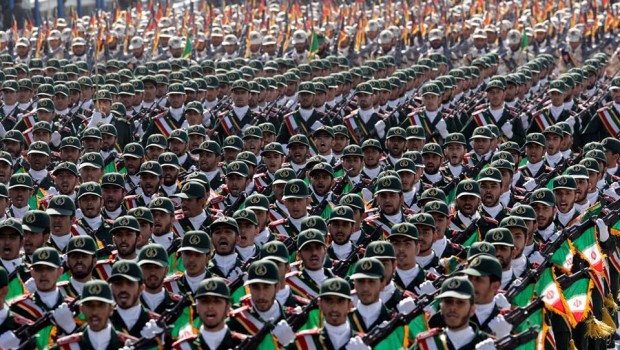Why Iran’s Revolutionary Guard Supports the Deal
by Narges Bajoghli
With the framework of the Iran nuclear accord now in place after eight days of intensive negotiations in Lausanne, Switzerland, the specter of conservatives in both Iran and the United States derailing a final deal looms large. Journalists and pundits point to Iran’s conservative Revolutionary Guard and paramilitary Basij organization as potential forces that could disrupt the hard work of President Hassan Rouhani and Foreign Minister Javad Zarif. But in fact the majority of members in the Revolutionary Guard and Basij actually want open relations with the west.

Our understanding in the West of Iran’s most important armed forces comes almost exclusively from second-hand reports and from formal declarations made by the public relations arm of these forces. Neither of these sources captures the complex reality of the internal dynamics of the Guard and Basij.
In over nine years of on-the-ground research with different factions of the Revolutionary Guard and Basij, I have found that an underlying concern for many, regardless of political leaning, is a desire to create an Iran with more opportunities for their children, and that means the removal of sanctions and better relations with the world.
After the 2009 crackdown in Iran, I interviewed over 150 members of the Revolutionary Guard and Basij. Seventy-five percent of those I interviewed vehemently disagreed with the conservative turn in Iranian politics during the presidency of Mahmoud Ahmadinejad. Most wanted an easing of relations with the West.
The Hardline Consolidates
Hardline factions control the judiciary and parliament in Iran today. But Mohammad Khatami, who ran on a platform of easing both domestic and international tensions, garnered well over 60 percent of the vote of the Revolutionary Guard and Basij when he ran for election in 2007 as Iran’s first reformist president. Those members have not disappeared.
With Khatami’s victory, the tide began to turn against the Supreme Leader, Ayatollah Ali Khamenei. Criticism against the regime mounted on the front pages of Iran’s burgeoning newspapers and an emboldened student movement emerged. In a bid to hold onto power, Khamenei strengthened conservative forces in the Revolutionary Guard and orchestrated a heavy crackdown against reformists. In a game of political maneuvering, he sidelined reformist Revolutionary Guard members as Khatami’s presidency drew to an end and positioned their conservative counterparts to increase power. This consolidation of power by the hardline increased during the first term of the Ahmadinejad presidency.
During the disputed 2009 presidential elections when the Green Movement emerged, reform-minded members of the Revolutionary Guard and Basij joined the millions of protestors against the reelection of Ahmadinejad. In a rarely told part of the Green Movement’s story, a number of Basij and retired Guard members were among those beaten up on the streets along with other protestors. One retired member of the Guard was brutally attacked while in a protest and suffered a heart attack at the hospital. Another captain of the Guard marched with his wife and daughters but kept his Revolutionary Guard identification card close at hand in order to ward off any trouble.
Younger members of the Guard, afraid to be seen in the protests and risk losing their jobs, never failed to say to me with a sympathetic smile in interviews and meetings that they liked my green notebook, referring to the color of the protest movement. It was their subtle way of letting me know on what side of the ever-widening chasm they stood in 2009 and 2010.
The Tide Shifts
Following 2009, “Basij” became a bad word in society, given that this paramilitary organization was one of many armed forces charged with attacking protestors during the months of unrest. After the events of that summer, every young Basij member I interviewed eventually admitted that he did not identify as a member of the paramilitary organization in public. It was just too embarrassing.
Even for those who did not support the Green Movement, the protests in 2009 constituted a crisis point: it was the first time since the 1979 revolution that a large cross-section of the population chanted loudly for change.
“We recognize that things cannot stay the same, especially for young people,” a hardline commander of the Guard told me, who considers the Green Movement protestors traitors to the country. Two months after our initial interview, his son asked me in private the best way to obtain a visa to leave the country.
There is much to criticize the Guard and Basij for: they have been a key part of a regime that violently oppresses those who dare to criticize, and they have been complicit in running a state that routinely discriminates against women, religious minorities, and ethnic minorities.
Despite this criticism, we cannot fully understand the Guard or Basij—and what they desire for the future of the regime they so vehemently support—if we continue to view them only through the lens of oppressors. We must understand their stories.
The story of the commanders and leaders of the Revolutionary Guard is one of coming of age while in the trenches of a bloody eight-year war with Iraq, in which the Iraqi side received the most sophisticated western weapons and funding. Hailing mostly from Iran’s lower socioeconomic classes prior to the 1979 revolution, they returned from the frontline only to contend with a population that blamed them for the country’s failings. These veterans have faced an uphill battle to gain respect from those in Iran’s educated and upper middle classes who look down on them. Despite their formal power within the regime today, they lack the cultural capital of distinction. The children of this particular generation tend to be highly educated, and some have secured lucrative jobs through their fathers’ connections. But the vast majority faces the same problems as a large swath of Iran’s youth: high unemployment and dwindling opportunities for growth.
Regardless of where they may lie on the political spectrum, the members of the Revolutionary Guard and Basij consider their number one priority to be the survival of the Islamic Republic. Today that means fixing Iran’s ailing economy and lifting the sanctions. The vast majority of pro-regime military and paramilitary forces recognize the need for change in Iran, mainly because of the bleak economic future their children face. A nuclear deal is a crucial step in that direction.
Narges Bajoghli is an advanced anthropology PhD candidate at New York University who has spent the last nine years conducting research in Iran with the Revolutionary Guard and paramilitary Basij organization. Her research has been awarded national grants by the National Science Foundation, the Social Science Research Council, The Wenner Gren Foundation for Anthropological Research, and the American Institute of Iranian Studies. She is also the director of a documentary about survivors of chemical warfare in Iran, The Skin That Burns, which has screened internationally. She has published articles on Iran in The Guardian, Middle East Research and Information Project (MERIP),The Huffington Post, and IranWire. She has also appeared as a guest commentator on Iranian politics on DemocracyNow!, BBC WorldService, BBC Persian, and HuffPost Live.


